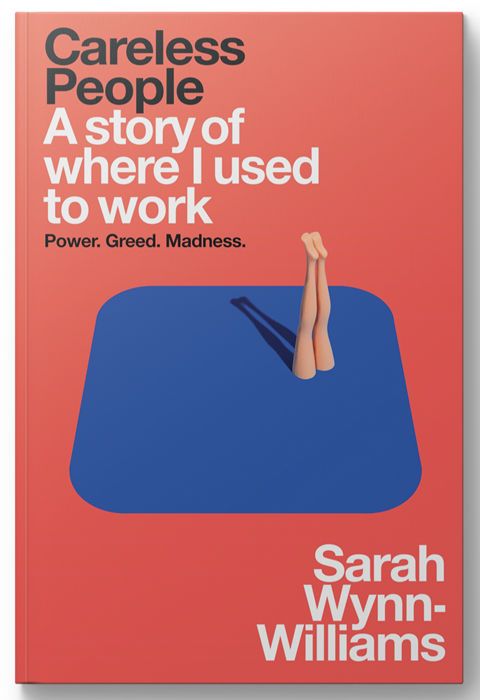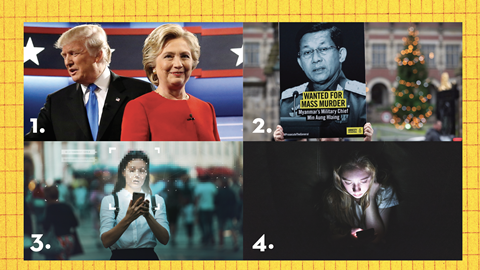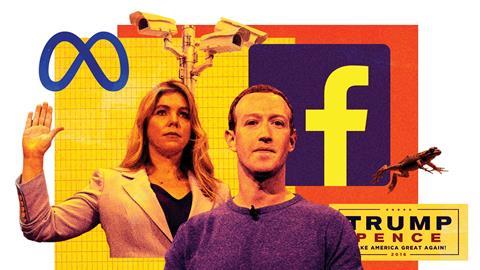Sarah Wynn-Williams’ explosive memoir exposes a dangerously dysfunctional culture at social media giant Facebook. But before we throw stones, the Church should consider what it can learn about unchecked power and unchallengeable leaders, says Martin Saunders
There’s a famous – and fairly gruesome – analogy about boiling a frog. It describes how said amphibian will never leap into a pan of hot water, but it won’t notice or move if you gradually raise the temperature, even to lethal levels. Preachers have been using it for years as an illustration of the dangers of exposing yourself to worldly culture. It’s not a nice picture, and research suggests it’s not even strictly accurate, but it’s often remarkably resonant. We are susceptible to gradual changes in the environment which mean that, over time, we don’t notice when it has become toxic. We can be the frog, bathing nonchalantly in the waters that are cooking us alive.
In March, former Facebook executive Sarah Wynn-Williams published her memoir, Careless People: A story of where I used to work (Macmillan). It details her six years at the Silicon Valley giant as it grew from a social media phenomenon to a global political force. It’s remarkable that the book even exists at all, considering the mega-rich organisation’s attempts to ban and suppress it, and it contains both shocking revelations and urgent lessons to those willing to look up from their smartphones and listen. It’s a frog’s-eye view of what it looks like to realise the water around you has reached boiling point – and a serious warning that all of us may be in similarly hot water too.

Shocking claims
It’s not quite accurate to say that Wynn-Wiliams was recruited by Facebook; she just about forced herself inside. As an idealistic young diplomat, the New Zealander had a vision for the platform’s potential influence that was greater than even that of its leadership. With almost prophetic insight, she could see its potential to create positive dialogue within and between nations, and to be a force for political change and good. She pitched her role – which eventually became director of global public policy – several times without success, until increasing international scrutiny and criticism of Facebook changed the company’s mind.
As she tells it at least, the job move was motivated by vision and hope, not by money. But what followed was a gradual dimming of that hope. First, a realisation that Facebook’s organisational culture was going off course, then that it was broken, and eventually that it had become profoundly toxic. What began as a dream of what might be possible morphed into an attempt to fix something from within – and finally an urgent desire to remove its golden handcuffs. Though the work was lucrative, it was also frequently horrifying.
What is going on in our churches, our culture and ourselves that we’re too comfortable to notice?
The list of accusations in Careless People is lengthy and shocking. They range from a claim that Facebook offered the Chinese government the ability to spy on their citizens in exchange for being allowed to launch in that lucrative market, to the suggestion that the platform decisively settled the 2016 US election for Donald Trump. In a nutshell, the book claims that Facebook is making enormous sums of money by causing enormous amounts of damage; not just in some abstract, brain-rotting sense, but in terms of lives being ended or changed, and entire nations switching course.
Alongside that, Wynn-Williams points the finger directly at high-profile leaders in the organisation. She exposes a culture of recklessness in which human suffering is ignored, while power and mega-wealth become the ultimate idols. She characterises celebrated tech pioneers as having a callous, even malevolent indifference. To co-opt that famous line from Jurassic Park, Facebook’s engineers “were so preoccupied with whether or not they could, they didn’t stop to think if they should.”
Despite Mark Zuckerberg’s frequent public pleas for free speech, Facebook’s parent company Meta tried to choke the book at point of release. Anticipating such a move, it was subject to an extraordinary covert release tragedy, which saw it delivered to bookshops around the world before a word of publicity or promotion had been uttered. Even the author’s own mother didn’t know about it. Meta then obtained an emergency ruling in the US which theoretically prevented Wynn-Williams from publicising the book and ordered her to retract disparaging comments “to the extent within her control”. Yet the book was already out in the world. And the controversy only fuelled interest in reading it.
A reliable narrator?
But wait. Wynn-Williams spent more than six years at Facebook and only left when she was fired (after complaining that she had suffered sexual harassment). She was well-compensated and rubbed shoulders with celebrities and presidents. If Facebook was so toxic – and the signs of this emerge fairly early in her tenure as she recounts it – why didn’t she leave sooner?
Reading Careless People involves a long wrestle with this question. It’s hard to sympathise as she describes flying in private jets and attending work retreats in high-end resorts. Opening with the story of her own childhood brush with death and the apparent indifference of her parents seems like a clear effort to win over the reader. I have to admit to struggling with a persistent feeling that I was listening to an unreliable narrator whose principles didn’t stretch quite as far as losing her enviable salary and benefits.
This has been the basis of much of the criticism the book has received. Wired magazine’s Steven Levy wrote that: “though she [Wynn-Williams] may not admit it, she’s one of the careless people too…wringing her hands over morally questionable practices and sometimes offering objections – but ultimately going with the flow.” In fact, the levels to which she bought into Facebook’s dysfunctional culture, including answering emails while in labour with her first child, are staggering. Yet the author doesn’t really appear to realise it. Meanwhile, Meta has called the book “a mix of out-of-date and previously reported claims about the company and false accusations about our executives”.
In the end, however, it’s hard not to see Wynn-Williams as a little heroic at least. The book’s publisher says that it stands on a mountain of corroborating evidence, and it seems inconceivable that the author would make some of her claims – particularly the ones targeting individuals – if they weren’t true. I believe her when she says she was the victim of sexual harassment not only at the hands of Joel Kaplan, now Meta’s president of global affairs, but also Sheryl Sandberg, the celebrated business leader and women’s activist. Wynn-Williams’ treatment of the latter throughout the book is nothing short of brutal. While she characterises Zuckerberg as a slightly hapless and pathetic figure, she draws a scathing picture of Sandberg as a self-obsessed hypocrite. It will be hard to now hear her once-ubiquitous buzz-phrase “lean in” without squirming a little. Even if it does feel like Wynn-Williams had a personal axe to grind, the stories she tells of Sandberg’s indifference – and general weirdness – beggar belief.
Do not like…

Careless People’s boldest claims
1. Facebook handed the 2016 election to Donald Trump
Wynn-Williams recounts a conversation on Zuckerberg’s private jet in which senior advisors explained to him all the ways that the platform had been manipulated to enable the Trump campaign to sway voters.
2. Facebook looked the other way as Myanmar’s Junta utilised the platform to enable genocide
The hardest-to-read passage in the entire book contrasts the United Nations’ reports of atrocities perpetrated against Myanmar’s Muslims by the military Junta, with the almost total indifference of the Facebook staff who were meant to be monitoring activity – despite clear evidence that violent groups were mobilising through their platform.
3. Concessions made to China constitute massive privacy violations
The book is packed with suggestions that Facebook collaborated with governments – and continues to do so – in alarming ways. The most shocking of these is the allegation that the company’s ultimately doomed pitch to China included offering the ability to monitor user data, including location sharing and facial recognition.
4. Meta have tools which target young people’s poor mental health
Wynn-Williams alleges that both Instagram and Facebook have tools which can be customised to exploit poor teenage mental health. These include being able to advertise beauty products to a girl who has just taken and deleted a selfie, for example.
A mirror to Christian leadership cultures
Perhaps you’re a Sandberg fan, admiring the way she has apparently shattered the glass ceiling for so many other female executives. You might naturally feel protective of your heroine. Yet this is one of the reasons why Careless People is such an important book – and a potentially instructive one for churches.
Facebook was, in the period the book chronicles, a fast-growing platform that captured the world’s imagination. A sign on the corporate office wall reads “Move fast and break things” – and that seems to have been a mantra for the early years of the company. They were propelled by rapid growth and success; pulled forward by the yawning potential in front of them. They made mistakes constantly, but such was the goodwill of their excited user base, they were instantly forgiven. Their unelected leaders became celebrities – but also held so much control that when the entity grew into a behemoth, they were so powerful they became unchallengable.
Sound familiar?
We can look on disapprovingly at what happened at Facebook, or we can recognise the parallels to what can – and does – happen all too often when churches and Christian ministries taste success. This has certainly been borne out in the stories of what happened around charismatic leaders such as Soul Survivor’s Mike Pilavachi or Vineyard’s Alan Scott. When allegations around both of these men first emerged, one of the major responses was disbelief – to the point that abuse survivors were not believed. It was only thanks to the courage of whistleblowers that the truth finally came out.
We need greater scrutiny, less unchallenged power and goals that go wider and deeper than simple numerical accumulation
This rarely comes without deep personal cost, and our admiration for those who stand up and call out bad behaviour should be great. It seems clear that Wynn-Williams’ reward for reporting sexual harassment and asking to be moved away from an abuser was to be fired. When a few courageous people did try to speak up at Soul Survivor, their concerns were played down because the ministry they were critiquing was seen as being too successful and important to fail; no one wanted to hear, let alone believe, the truth. Many who have spoken up in other spaces have seen their concerns ignored or glossed over, then found themselves utterly exposed. We have to develop longer memories when whistles are blown – another challenge in a distracted age in which we’re constantly moving on to the next new thing.
Reading Careless People and picturing the kind of dysfunctional leadership structure it describes should give any leader pause. Zuckerberg was so revered by his senior staff that they allowed him to win at board games just to stay in his good favour. Few dared to challenge him, or Sandberg, who would make bizarre requests of junior staff too awestruck to question them. If a culture looks like this, it’s a broken one. And Facebook is by no means the only example.
Why didn’t the many people who witnessed or experienced the abuses of Christian leaders like Pilavachi and Scott (or the tragically long list I could extend here, including recent revelations from the world of Christian music) speak up earlier? Because slowing heating water is really hard to detect when you’re floating in it. There have been many criticisms of individuals who didn’t blow the whistle earlier, but perhaps we need to extend more grace; when you mix charismatic leaders and exciting, ground-breaking cultures, a balanced perspective is a very difficult thing to achieve. Wisdom after the event is, by comparison, very easy.
Back to boiling frogs…
With that thought in mind, it’s hard to be too tough on Facebook’s intrepid whistleblower. But what is the real challenge of this book?
Much of the answer is familiar. Silicon Valley has operated largely unregulated and unchecked for far too long. Governments need to step in and push back harder on issues like tax evasion, privacy and data protection. As we become wiser about leadership cultures, both in businesses and organisations like the Church, we need greater scrutiny, less unchecked and unchallenged power, and goals that go wider and deeper than simple numerical accumulation. We need to move beyond paying lip service to issues of sexual harassment and other abuses of power. None of this is news, of course. But if the problem had been solved, we wouldn’t still be discussing it.
Here’s the real question though. What else is going on – in our churches, our culture and ourselves – that we’re just too comfortable to notice? In the book’s terrifying coda, Wynn-Williams raises the example of AI, which we’re currently using to create funny images but which will have much more significant implications. There are countless others, from the environmental impact of the things we take for granted, to political co-option of Christianity into nationalist narratives. What else is getting a free pass while we’re distracted by novelty, comfort or even signs of growth and encouragement? Because the lesson of Careless People is that, like that tragic frog, when you finally realise how hot the water has become, it’s already too late.
Postscript: If you’re interested in testing Wynn-Williams’ claims about how Facebook manipulates its algorithm, why not try posting this article on there yourself, and seeing how many people read and engage…







































No comments yet